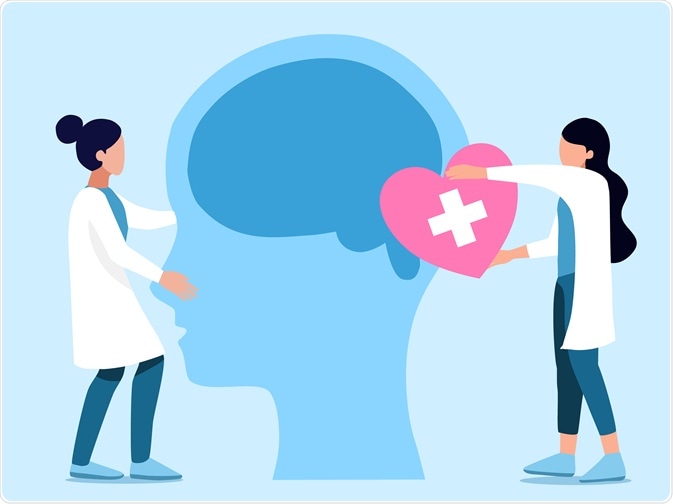According to the World Health Organisation (WHO), health is “A state of complete physical, mental and social well-being and not merely the absence of disease.”
 Image Credit: A Plus Vector /Shutterstock.com
Image Credit: A Plus Vector /Shutterstock.com
The importance of looking after physical health by adopting a healthy lifestyle is a familiar concept. It is widely accepted that adopting behaviors such as eating a healthy diet, taking regular exercise, moderating alcohol intake, and avoiding tobacco products have a demonstrable impact on the risk of developing serious illness and reduced life expectancy.
Whilst prevention of disease or injury in physical health is at the heart of many public health promotion strategies, mental healthcare has traditionally focused on treating established mental illness.
Increasingly, however, researchers and clinicians are drawing a distinction between mental illness and good mental health or wellbeing. Conceptually, mental health has three components:
- Emotional wellbeing: Includes positive emotions such as happiness, interest and motivation, and satisfaction.
- Psychological wellbeing: Having positive relationships with others, liking one’s personality, and managing daily responsibilities.
- Social wellbeing: Feeling part of a community, contributing to society, and making sense of how society operates.
Mental health can, therefore, fluctuate in response to life events or daily stresses and exists across a spectrum. Looking after one’s mental health is beneficial during periods of poorer wellbeing, to prevent further decline and promote improvement. Adopting strategies to enhance mental health when wellbeing is high can increase resilience to cope during periods of stress.
Looking after your mental health
There are many ways in which people can look after their mental health, but evidence suggests there are five behaviors that may enhance feelings of positivity and benefit most from life.
Connecting with others
Good relationships with others enhance mental wellbeing by providing a sense of belonging, self-worth, and emotional support. Feeling close to and valued by others is a fundamental human need and is critical to functioning positively in the world. Some actions to build strong and close relationships might include:
- Taking time together as a family, for example eating meals together daily.
- Opting to use telephone or video-chat with others rather than email.
- Visiting a friend or family member who needs company or support.
Physical activity
Regular activity is associated with lower rates of mental illness, slowing age-related cognitive decline, and increasing mental wellbeing. Exercise can relieve stress, raise self-esteem, and improve sleep. Some ways in which activity can be incorporated into daily life include:
- Building a daily walk into each day. Research suggests that activity in outdoor, green environments has a greater positive impact on wellbeing than indoor activity.
- Finding an organized activity such as a dance class or sports group, which also increases opportunities for connecting with others.
Learning new skills
Continued learning through life enhances wellbeing by promoting a feeling of accomplishment, enhances self-esteem and can increase social interaction. Setting goals for learning is particularly associated with improvements to wellbeing. Examples might include:
- Taking on a new responsibility at work such as mentoring or completing training.
- Taking on a hobby such as learning a new language or cooking new recipes.
- Signing up for an adult education course.
Giving to others
Taking an active role in one’s community or social network by completing altruistic tasks or acts of kindness creates positive feelings and a sense of purpose, self-worth, and reward. Example activities include:
- Volunteer work in the local community.
- Offering to help friends or family members with a task or project.
Mindfulness
Mindfulness refers to paying attention to the present moment and reconnecting with our body. This includes attending to one’s own thoughts, feelings and bodily sensations as well as attending to the immediate environment. It is thought to boost wellbeing by becoming increasingly aware of thought patterns, and in doing so identify unhelpful thinking styles. To become more mindful, researchers suggest:
- Reminding the self to take notice of thoughts, feelings, and the surrounding environment.
- Setting a regular time each day to practice mindful thinking.
- Trying something new, such as taking a new route home.
Considerations during the COVID-19 pandemic
The pandemic has had a far-reaching impact on well-being. It raises feelings of fear and frustration, economic concerns, and health concerns. Societal restrictions have impacted typical coping strategies such as spending time with loved ones and engaging in recreational activities, so keeping in touch digitally may be helpful.
Whilst staying connected with news and gathering information about precautions to minimize infection may be helpful for some, care should be taken to ensure this comes from a reliable source.
Constantly checking for new information via social media and news coverage can heighten anxiety, confusion, and fear. Setting boundaries around the type and amount of time spent consuming media can lessen worry. This is something that can be applied generally to social media consumption, as social media can be a key contributor to negative mental health in modern society.
Top 10 tips to maintain your mental health
References
- Aune, D., Giovannucci, E., Boffetta, P., Fadnes, L. T., Keum, N., Norat, T., Greenwood, D. C., Riboli, E., Vatten, L. J., & Tonstad, S. (2017). Fruit and vegetable intake and the risk of cardiovascular disease, total cancer and all-cause mortality-a systematic review and dose-response meta-analysis of prospective studies. International journal of epidemiology, 46(3), 1029–1056. https://doi.org/10.1093/ije/dyw319
- Galderisi, S., Heinz, A., Kastrup, M., Beezhold, J., & Sartorius, N. (2015). Toward a new definition of mental health. World psychiatry : official journal of the World Psychiatric Association (WPA), 14(2), 231–233. https://doi.org/10.1002/wps.20231
- NHS Confederation. Five Ways to Wellbeing: New applications, new ways of thinking. [online] Available at: <https://neweconomics.org/uploads/files/d80eba95560c09605d_uzm6b1n6a.pdf> [Accessed 31 March 2021].
- Slade M. (2010). Mental illness and well-being: the central importance of positive psychology and recovery approaches. BMC health services research, 10, 26. https://doi.org/10.1186/1472-6963-10-26
Last Updated: Jan 17, 2022